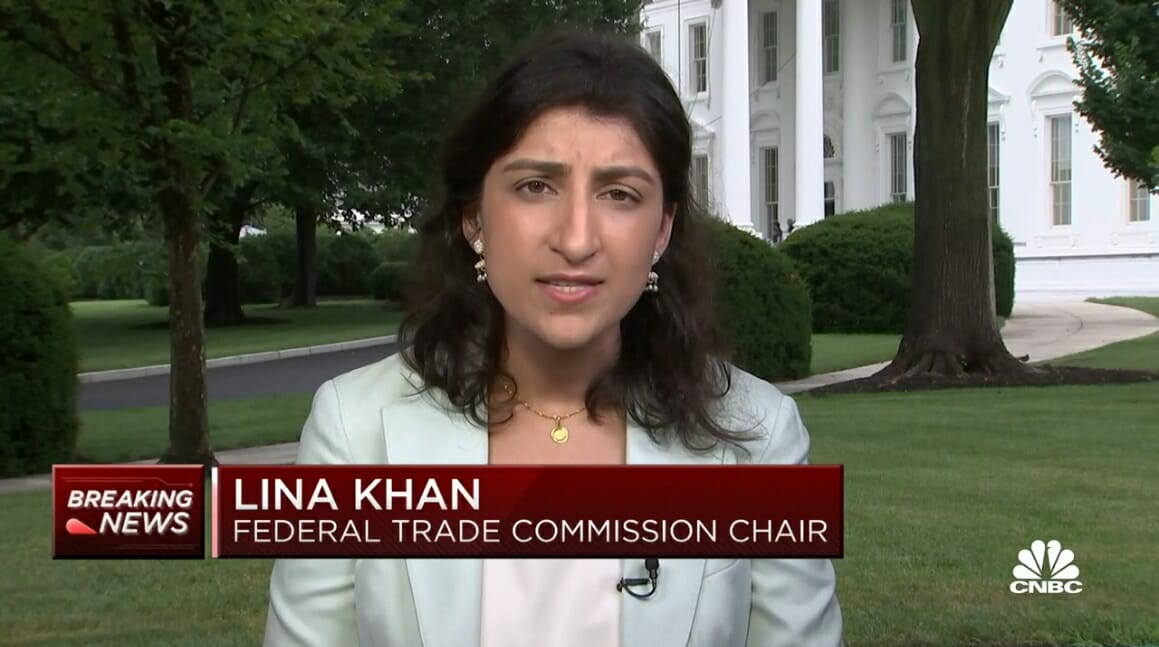Following are excerpts from the unofficial transcript of a CNBC interview with FTC Chair Lina Khan on CNBC’s “Squawk on the Street” (M-F, 9AM-12PM ET) today, Wednesday, July 19.
FTC Chair Lina Khan On Microsoft-Activision Loss: We Fully Believe In Our System Of Judicial Review
Khan On The Law And Reviewing Guidelines
LINA KHAN: These guidelines reflect the law. If you look through the document, you will see a lot of footnotes to appellate court decisions and Supreme Court decisions. We read through every litigated merger decision that resulted in a decision from the federal court of appeals or the Supreme Court, and so this document designed to make sure everybody is on notice about what the state of the law is.
KHAN: I think it’s absolutely true that enforcers need to be reviewing the guidelines with an eye to the way in which businesses are pursuing M&A and the ways in which our economy is actually functioning. We are confident that we’ve gotten a lot of input and as part of this process, these guidelines are really addressing some of the key issues we are seeing across the markets.
Khan On Enforcing Merger Laws
KHAN: Congress asked us to enforce the merger laws and that is necessarily a predictive exercise. As a result, the inquiry that we undertake is a risk assessment. We are assessing the risk that a merger may substantially lessen competition or create a monopoly and that’s what Congress has instructed us to do.
Khan On Vertical Merger Competition And Preserving Competition
KHAN: When putting together these guidelines, we noted that historically the courts have recognized a few ways in which vertical mergers can be lessening competition, including by giving a company key control over critical inputs that its rivals depend upon, but that’s just one way. There are a whole set of other ways that these types of mergers can risk lessening competition and the 13 guidelines are intended to really lay that all out very clearly.
KHAN: We consider every matter on a case-by-case basis. Our obligation is to preserve competition and make sure that mergers are not unlawfully lessening competition. If parties are putting before us remedies or potential packages that they claim would do that, we look at that very closely. But at the end of the day, our job is to protect the public and we need to make sure that the public is not bearing the risk of a failed remedy.
Khan On Merger Proposal Update
KHAN: Another change that we recently proposed was update the information that merging parties have to provide us when they are proposing a merger and the goal there is to make sure that our agency is able to conduct these investigations much more efficiently and much more effectively, so we don’t have to waste time kind of going back and forth getting information that the parties already have on day one and that we need in order to be able to make our assessment about whether a deal does or does not raise those concerns.
Khan On Agreements And Rollup Strategies
KHAN: There are various cooperation agreements in place. Again, some of them going back to the Bush administration that layout appropriate processes. Sometimes it’s businesses that want to encourage the FTC to be talking to other enforcers to ensure more streamlined review and more efficient information sharing. So this has been a long-standing process.
I’m grateful that the FTC is viewed as a leader internationally and all credit goes to our terrific staff at the office of international affairs that, for many years now, have been insuring that we are sharing our experience and expertise around the world.
KHAN: These guidelines are agnostic as to particular business model, but we wanted to make sure we are being clear eyed about business trends that we’ve seen in the markets. One trend we have seen is rollup strategies. So instances in which a firm will undertake a series of acquisitions, no single one of which may raise legal concerns but in aggregate, there can be can significant consolidation of a market.





